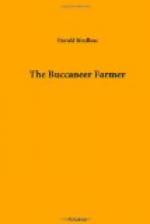They got to work, but the current that undermined the bank brought down the turf and soil with which they tried to fill the holes. It was plain that a stronger material was needed and Kit sent some men to a roadmaker’s quarry at the bottom of the fell while he rearranged some harness. When he had finished he fastened an extra horse outside the shafts of the carts and two men drove the teams across the field. They went off fast, jolting the carts by their clumsy trot, but Kit knew the extra horse would be needed when they returned. Soon afterwards, Osborn came up the other bank and stopped opposite with the rain running off his mackintosh.
“Has anybody given you leave to meddle with the dyke?” he asked.
“No,” said Kit. “We’ll let it alone, if you like, but there won’t be much of your hay left when the flood breaks through, and I imagine you could be made responsible for other damage.”
Osborn hesitated and Kit, seeing his frown, began to wonder whether he would send him away. Then he resumed: “Who engaged these men?”
“I don’t know that they are engaged. Anyhow, if there’s a difficulty about their getting paid, I’m accountable.”
“Bring them to Tarnside when you have finished,” Osborn answered and went off.
Kit resumed his work with savage energy. He thought Osborn did not deserve to be helped, but this did not matter much. Others would suffer unless he finished the job he had undertaken and it almost looked as if the flood would beat him. The trench from which they dug the soil they needed filled with water, the spades got slippery with rain and mud, and the horses sank in the trampled slough. Kit, however, had made his plans while he looked for help and had forgotten nothing that he might want. Hammers, drills, and a can of powder had been brought, and now and then a dull report rolled across the dale and heavy stones crashed in the quarry.
When he had stone enough he and one or two others stood on the front of the bank with the water washing round their legs while they built up the ragged blocks. The pieces were hard to fit and sometimes the rude wall broke when the men on top threw down the backing of soil. Kit tore his hand on a sharp corner, but persisted while the blood ran down his fingers and his wet clothes stuck to his skin. The others supported him well and he only stopped for breath and to wipe from his eyes the water that trickled off his soaked hat. The loaded cart, ploughing through the mire, met the other going back; the men at the quarry kept him supplied, and when he had made a foundation the bank began to rise. For all that, the beck rose almost as fast, and at noon they had not gained much on the flood. Kit was doubtful, but on the whole thought it prudent to let the men stop. They had worked hard and could not keep it up without a rest.
When they collected with their dinner cans under a dripping hedge, one remarked: “Mayhappen we’d better wait for Osborn to send cold meat and ale. I’ll mak’ a start with bread and cheese.”




